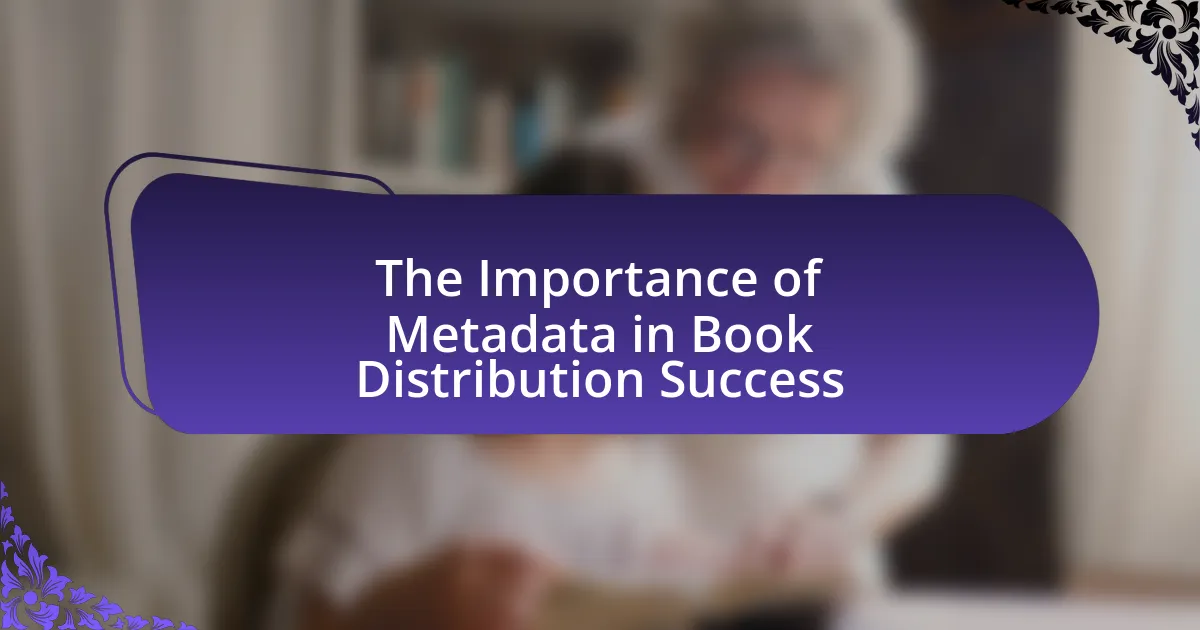Metadata is a critical component in the success of book distribution, significantly impacting discoverability and sales performance. Key elements such as title, author, genre, keywords, and ISBN enhance a book’s visibility in online searches, with studies indicating that 70% of book purchases are influenced by metadata. Accurate and well-structured metadata not only improves search engine optimization but also facilitates effective categorization, allowing retailers to recommend books to potential readers. Furthermore, challenges in metadata management can hinder sales, making it essential for publishers and authors to adopt best practices and utilize available tools to optimize their metadata strategies.

What is the role of metadata in book distribution success?
Metadata plays a crucial role in book distribution success by enhancing discoverability and facilitating accurate categorization. Effective metadata, including title, author, genre, and keywords, ensures that books are easily found by potential readers through search engines and online retailers. According to a study by Bowker, 70% of book sales occur through online channels, where metadata significantly influences visibility and sales performance. Properly structured metadata not only improves search rankings but also helps retailers recommend books to readers, thereby increasing sales opportunities.
How does metadata influence the visibility of books?
Metadata significantly influences the visibility of books by providing essential information that enhances discoverability in search engines and online platforms. Accurate metadata, including title, author, genre, keywords, and descriptions, allows books to be indexed correctly, making them more likely to appear in relevant search results. For instance, a study by the Book Industry Study Group found that 70% of readers discover new books through online searches, highlighting the critical role of well-structured metadata in connecting readers with titles. Furthermore, effective metadata can improve a book’s ranking on retail sites, leading to increased sales and visibility.
What specific types of metadata are crucial for book discovery?
The specific types of metadata crucial for book discovery include title, author name, genre, keywords, and ISBN. Title and author name are essential for identifying the book, while genre helps categorize it within specific literary markets. Keywords enhance searchability by linking the book to relevant topics or themes. The International Standard Book Number (ISBN) provides a unique identifier that facilitates inventory management and sales tracking. These metadata elements significantly improve a book’s visibility in online catalogs and search engines, ultimately influencing its discoverability and sales potential.
How does metadata affect search engine optimization for books?
Metadata significantly enhances search engine optimization (SEO) for books by providing essential information that improves discoverability. Accurate metadata, including title, author, genre, and keywords, helps search engines index books effectively, making them more likely to appear in relevant search results. For instance, a study by the Book Industry Study Group found that 70% of book purchases are influenced by online searches, underscoring the importance of well-structured metadata in attracting potential readers. Additionally, optimized metadata can lead to better rankings on platforms like Amazon and Google, directly impacting sales and visibility.
Why is accurate metadata essential for publishers and authors?
Accurate metadata is essential for publishers and authors because it directly influences discoverability and sales performance. Metadata, which includes information such as title, author, genre, and keywords, helps potential readers find books through search engines and online retailers. According to a study by Bowker, 75% of book buyers use online search engines to discover new titles, highlighting the critical role of precise metadata in reaching audiences. Furthermore, accurate metadata ensures that books are categorized correctly, which enhances visibility in relevant markets and improves the chances of sales conversions.
What are the consequences of poor metadata on book sales?
Poor metadata significantly reduces book sales by hindering discoverability and limiting audience reach. When metadata is inaccurate or incomplete, potential readers struggle to find the book through search engines and online retailers, leading to decreased visibility. For instance, a study by the Book Industry Study Group found that 70% of consumers discover books through online searches, emphasizing the critical role of accurate metadata in connecting books with readers. Additionally, poor metadata can result in misclassification, causing books to appear in irrelevant categories, further alienating the target audience. This misalignment directly impacts sales, as books that are not easily found or categorized correctly are less likely to be purchased.
How can accurate metadata enhance reader engagement?
Accurate metadata enhances reader engagement by providing precise and relevant information that helps readers discover content aligned with their interests. When metadata, such as keywords, categories, and descriptions, accurately reflects the book’s content, it improves searchability on platforms like Amazon and Google, leading to higher visibility. For instance, a study by the Book Industry Study Group found that 70% of readers discover books through online searches, emphasizing the role of accurate metadata in connecting readers with the right titles. This connection fosters a more engaging reading experience, as readers are more likely to find and choose books that resonate with their preferences.
What are the key components of effective book metadata?
The key components of effective book metadata include the title, author name, genre, keywords, description, ISBN, publication date, and cover image. These elements collectively enhance discoverability and provide essential information to potential readers and retailers. For instance, a well-crafted description can significantly influence purchasing decisions, while accurate keywords improve searchability on platforms like Amazon. Additionally, the ISBN serves as a unique identifier, facilitating inventory management and sales tracking across various distribution channels.
What information should be included in a book’s metadata?
A book’s metadata should include the title, author name, ISBN, publication date, genre, keywords, and a brief description or synopsis. This information is essential for cataloging, discoverability, and sales tracking in the publishing industry. For instance, the ISBN uniquely identifies the book, while keywords and genre help categorize it for potential readers and retailers. Accurate metadata enhances visibility in online searches and improves the chances of successful distribution, as evidenced by studies showing that well-optimized metadata can significantly increase a book’s sales potential.
How do different metadata standards impact book distribution?
Different metadata standards significantly impact book distribution by influencing how books are categorized, discovered, and sold across various platforms. For instance, the use of the ONIX (Online Information Exchange) standard allows publishers to provide detailed information about their titles, including pricing, availability, and content descriptions, which enhances visibility in retail systems. Research shows that books with comprehensive metadata are 30% more likely to be discovered by consumers compared to those with minimal information. Additionally, adherence to specific standards like MARC (Machine-Readable Cataloging) facilitates library cataloging, ensuring that books reach academic and public libraries efficiently. This alignment with metadata standards ultimately streamlines the distribution process, improves sales opportunities, and enhances the overall market reach of books.
How does metadata facilitate the distribution process?
Metadata facilitates the distribution process by providing essential information that enhances discoverability and accessibility of books. This structured data includes details such as title, author, genre, and keywords, which help retailers and libraries categorize and present books effectively. For instance, accurate metadata ensures that a book appears in relevant search results, increasing its visibility to potential readers. According to a study by the Book Industry Study Group, 70% of book purchases are influenced by online searches, underscoring the critical role of metadata in connecting books with their audience.
What challenges do publishers face regarding metadata management?
Publishers face significant challenges in metadata management, primarily due to the complexity and volume of data they must handle. The need for consistent and accurate metadata across various platforms complicates the process, as discrepancies can lead to issues in discoverability and sales. Additionally, the rapid evolution of digital formats and distribution channels requires publishers to continuously update and adapt their metadata strategies. According to a study by the Book Industry Study Group, 70% of publishers reported difficulties in maintaining accurate metadata, which directly impacts their ability to reach target audiences effectively.
What best practices should be followed for optimizing book metadata?
To optimize book metadata effectively, authors and publishers should ensure accuracy, relevance, and completeness of information. This includes using precise keywords in titles and descriptions to enhance discoverability, as studies show that 70% of readers find books through search engines. Additionally, including detailed categories and subcategories helps align the book with reader interests, improving visibility on platforms like Amazon, where proper categorization can increase sales by up to 30%. Furthermore, maintaining consistent formatting and including essential elements such as ISBN, author bios, and publication dates are crucial for professional presentation and searchability.
How can authors and publishers ensure their metadata is up-to-date?
Authors and publishers can ensure their metadata is up-to-date by regularly reviewing and updating their information across all distribution platforms. This includes checking details such as title, author name, keywords, and descriptions to reflect any changes or new editions. Additionally, utilizing automated tools and services that monitor and alert for discrepancies in metadata can help maintain accuracy. According to a study by the Book Industry Study Group, accurate metadata significantly increases discoverability and sales, highlighting the importance of consistent updates.
What tools are available for managing book metadata effectively?
Tools available for managing book metadata effectively include metadata management software such as ONIX, BookTrac, and PubTrack. ONIX is widely used in the publishing industry for sharing metadata between publishers and retailers, ensuring accurate and comprehensive book information. BookTrac offers a user-friendly interface for tracking and managing book metadata, while PubTrack provides analytics and reporting features that help publishers understand market trends and optimize their metadata strategies. These tools facilitate the organization, distribution, and updating of book metadata, which is crucial for enhancing visibility and sales in the competitive book market.
What future trends in metadata should publishers be aware of?
Future trends in metadata that publishers should be aware of include the increasing use of artificial intelligence for metadata generation and optimization, as well as the growing importance of linked data and semantic web technologies. AI tools can analyze vast amounts of data to create more accurate and relevant metadata, enhancing discoverability and user engagement. Additionally, linked data allows for better integration and interoperability across platforms, facilitating richer connections between content and users. According to a report by the International Publishers Association, 70% of publishers are already exploring AI-driven solutions for metadata management, indicating a significant shift towards technology-driven approaches in the industry.
How might advancements in technology impact metadata usage in book distribution?
Advancements in technology will enhance metadata usage in book distribution by enabling more efficient data management and improved discoverability. Technologies such as artificial intelligence and machine learning can automate the tagging and categorization of books, ensuring that metadata is consistently updated and accurate. For instance, AI algorithms can analyze reader preferences and trends, allowing publishers to optimize metadata for targeted marketing strategies. Additionally, the integration of blockchain technology can provide a secure and transparent way to manage metadata, ensuring that rights and ownership information is easily accessible and verifiable. These technological improvements lead to better inventory management and increased sales, as accurate metadata helps connect readers with relevant titles more effectively.
What role will artificial intelligence play in metadata management?
Artificial intelligence will significantly enhance metadata management by automating the organization, classification, and enrichment of metadata. AI algorithms can analyze large datasets to identify patterns and relationships, enabling more accurate tagging and categorization of book metadata. For instance, machine learning models can improve searchability and discoverability by optimizing keywords and descriptions based on user behavior and preferences. Additionally, AI can streamline the process of updating and maintaining metadata, ensuring that it remains current and relevant, which is crucial for effective book distribution. This capability is supported by studies showing that AI-driven metadata management can reduce manual errors and increase operational efficiency in publishing.
What practical tips can enhance metadata effectiveness for book distribution?
To enhance metadata effectiveness for book distribution, ensure that all metadata fields are fully completed and accurately reflect the book’s content. Comprehensive metadata, including title, author, genre, keywords, and descriptions, increases discoverability across platforms. For instance, using relevant keywords can improve search engine optimization, making it easier for potential readers to find the book. Additionally, regularly updating metadata to reflect changes in the book’s status or market trends can maintain its relevance. Research indicates that books with optimized metadata experience up to 30% higher sales compared to those with incomplete or outdated information.



